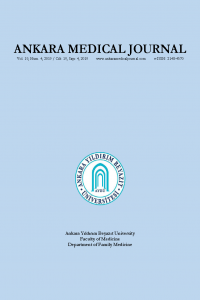Abstract
Objectives: Familial Mediterranean fever (FMF) is the most common hereditary auto-inflammatory disease. Our aim in the current study was to evaluate the relation between gender and clinical findings, the severity of disease and treatment compliance in FMF patients.
Materials and Methods: Medical records of the 150 FMF patients were retrospectively evaluated. Disease severity scores were evaluated with the international severity score system for familial Mediterranean fever (ISSF), treatment compliance of the patients was evaluated with six-item modified Morisky scale and compared between males and females.
Results: Of the 150 patients, 87 (58 %) were female and 63 (42 %) were male. Erysipelas like erythema (ELE) was more common in females (51.70% vs 30.90%, p= 0.03) and myalgia were more common in males (31.03% vs 36.50%, p=0.015). Other clinical findings were at similar frequencies.
The ISSF scores of the groups were similar (2.93±2.05 vs 3.12±2.21, p= 0.716).
The motivation for treatment and knowledge levels were the same in both groups (p=0.228 and p=0.112, respectively).
Conclusion: Clinical findings, ISSF scores and treatment compliance of the FMF patients in both sexes are similar. The gender of the patient does not affect the clinical course of disease in FMF patients.
References
- Sari I, Birlik M, Kasifoglu T. Familial Mediterranean fever: an updated review. Eur J Rheumatol 2014;1:21-3.
- Kasifoglu T, Bilge SY, Sari I, et al. Amyloidosis and its related factors in Turkish patients with familial Mediterranean fever: a multicentre study. Rheumatology (Oxford) 2014;53(4):741-5.
- Livneh A, Langevitz P, Zemer D, et al. Criteria for the diagnosis of familial Mediterranean fever. Arthritis Rheum. 1997;40(10):1879-85 (doi:10.1002/art.1780401023).
- Demirkaya E, Acikel C, Hashkes P, et al. FMF Arthritis Vasculitis and Orphan disease Research in pediatric rheumatology (FAVOR). Development and initial validation of international severity scoring system for familial Mediterranean fever (ISSF). Ann Rheum Dis. 2016;75(6):1051-6.
- Vural B, Acar OT, Topsever P, Filiz TM. Reliability And Validity Of Turkish Version Of Modified Morisky Scale. Tur Fam Physician. 2012;3(2):17-20.
- Pras E, Livneh A, Balow Jr JE, ve ark. Clinical differences between North African and Iraqi Jews with familial Mediterranean fever. Am J Med Genet 1998;75(2):216-9.
- Mor A, Shinar Y, Zaks N, et al. Evaluation of disease severity in familial Mediterranean fever. Semin Arthritis Rheum. 2005;35(1):57-64.
- Sönmez HE, Esmeray P, Batu ED, et al. Is age associated with disease severity and compliance to treatment in children with familial Mediterranean fever? Rheumatol Int. 2019;39(1):83-7.
Abstract
Giriş: Ailevi Akdeniz ateşi (AAA) en sık görülen herediter, oto-inflamatuar hastalıktır. Bu çalışmada amacımız AAA hastalarında cinsiyet ve klinik bulgular, hastalık şiddeti ve tedavi uyumu arasındaki ilişkiyi incelemektir.
Materyal ve Metot: AAA tanılı 150 hastanın arşiv dosyaları retrospektif olarak incelendi. Hastalık şiddeti uluslararası AAA şiddet skorlama sistemi (ISSF) ile, tedavi uyumları 6 maddeli modifiye Morisky ölçeği ile değerlendirildi ve cinsiyetler arası kıyaslandı.
Bulgular: AAA tanılı 150 hastanın 87’si (%58) kadın ve 63’ü (%42) erkekti. Erezipel benzeri eritem (EBE) kadınlarda (%51,70 ve %19, p= 0,03) ve miyalji erkeklerde daha sıktı (% 31 ve % 36,50, p=0,015). Diğer klinik bulgular cinsiyetler arası farklılık göstermedi. ISSF skorları arasında da farklılık saptanmadı (2,93±2,05 ve 3,12±2,2; p=0,716). Tedavi uyumu ve bilgi düzeyleri her iki grupta benzerdi. (sırasıyla p=0,228 ve p=0,112,).
Sonuç: AAA hastalarında klinik bulgular, ISSF skorları, tedavi uyumu cinsiyetler arası farklılık göstermemektedir. AAA hastalarında cinsiyetin prognoz üzerine etkisi yoktur.
Keywords
References
- Sari I, Birlik M, Kasifoglu T. Familial Mediterranean fever: an updated review. Eur J Rheumatol 2014;1:21-3.
- Kasifoglu T, Bilge SY, Sari I, et al. Amyloidosis and its related factors in Turkish patients with familial Mediterranean fever: a multicentre study. Rheumatology (Oxford) 2014;53(4):741-5.
- Livneh A, Langevitz P, Zemer D, et al. Criteria for the diagnosis of familial Mediterranean fever. Arthritis Rheum. 1997;40(10):1879-85 (doi:10.1002/art.1780401023).
- Demirkaya E, Acikel C, Hashkes P, et al. FMF Arthritis Vasculitis and Orphan disease Research in pediatric rheumatology (FAVOR). Development and initial validation of international severity scoring system for familial Mediterranean fever (ISSF). Ann Rheum Dis. 2016;75(6):1051-6.
- Vural B, Acar OT, Topsever P, Filiz TM. Reliability And Validity Of Turkish Version Of Modified Morisky Scale. Tur Fam Physician. 2012;3(2):17-20.
- Pras E, Livneh A, Balow Jr JE, ve ark. Clinical differences between North African and Iraqi Jews with familial Mediterranean fever. Am J Med Genet 1998;75(2):216-9.
- Mor A, Shinar Y, Zaks N, et al. Evaluation of disease severity in familial Mediterranean fever. Semin Arthritis Rheum. 2005;35(1):57-64.
- Sönmez HE, Esmeray P, Batu ED, et al. Is age associated with disease severity and compliance to treatment in children with familial Mediterranean fever? Rheumatol Int. 2019;39(1):83-7.
Details
| Primary Language | English |
|---|---|
| Subjects | Health Care Administration |
| Journal Section | Research Articles |
| Authors | |
| Publication Date | November 28, 2019 |
| Published in Issue | Year 2019 Volume: 19 Issue: 4 |

